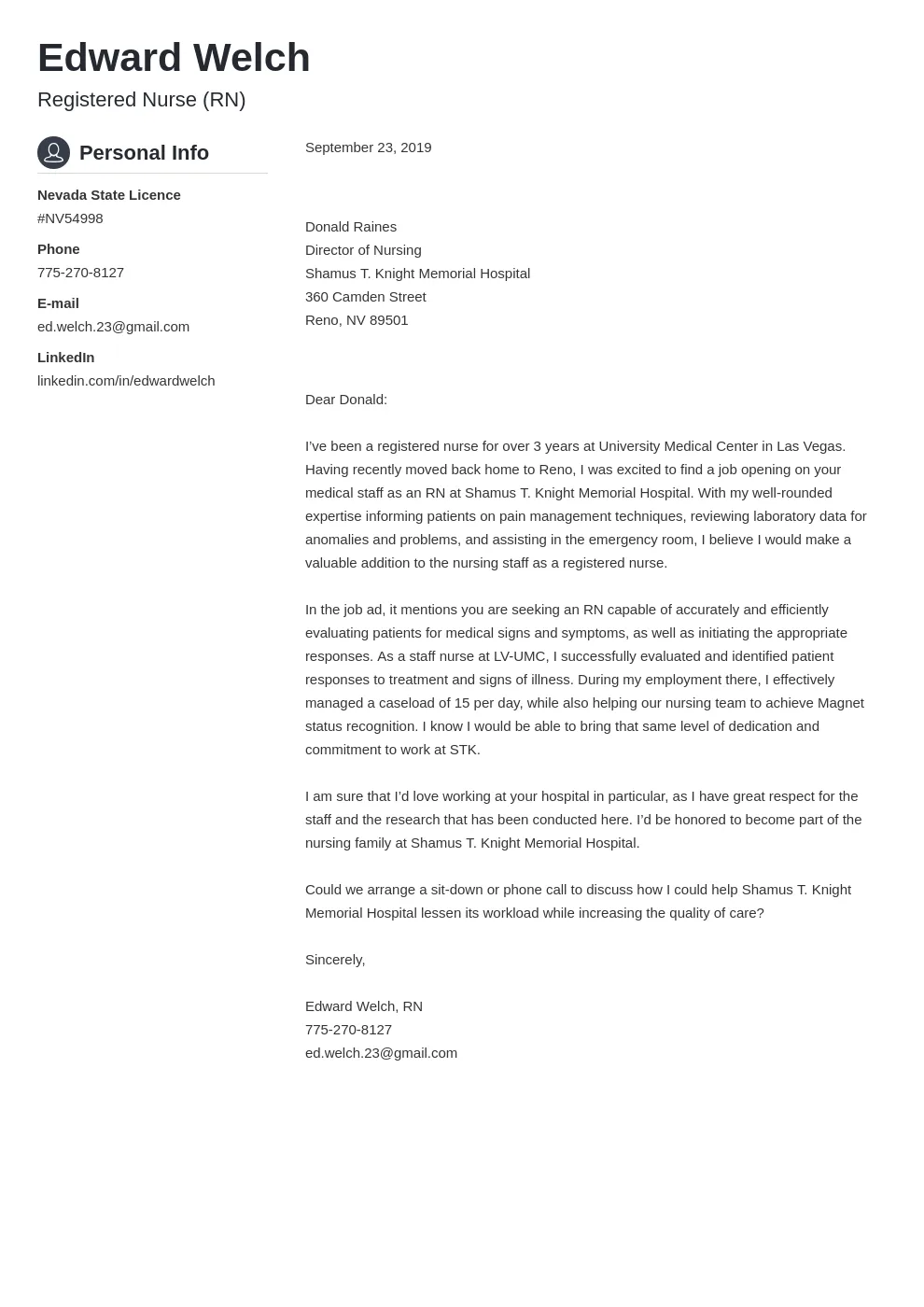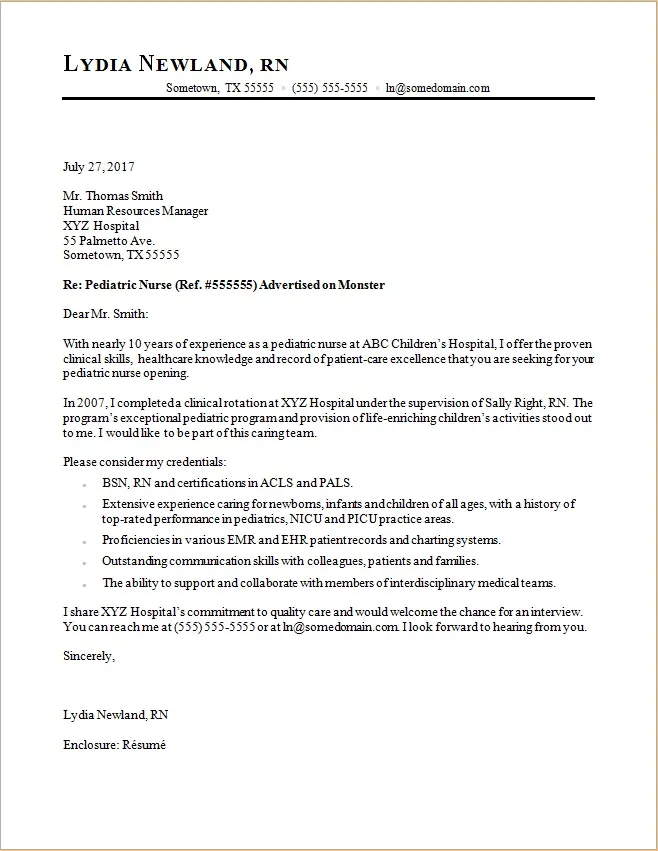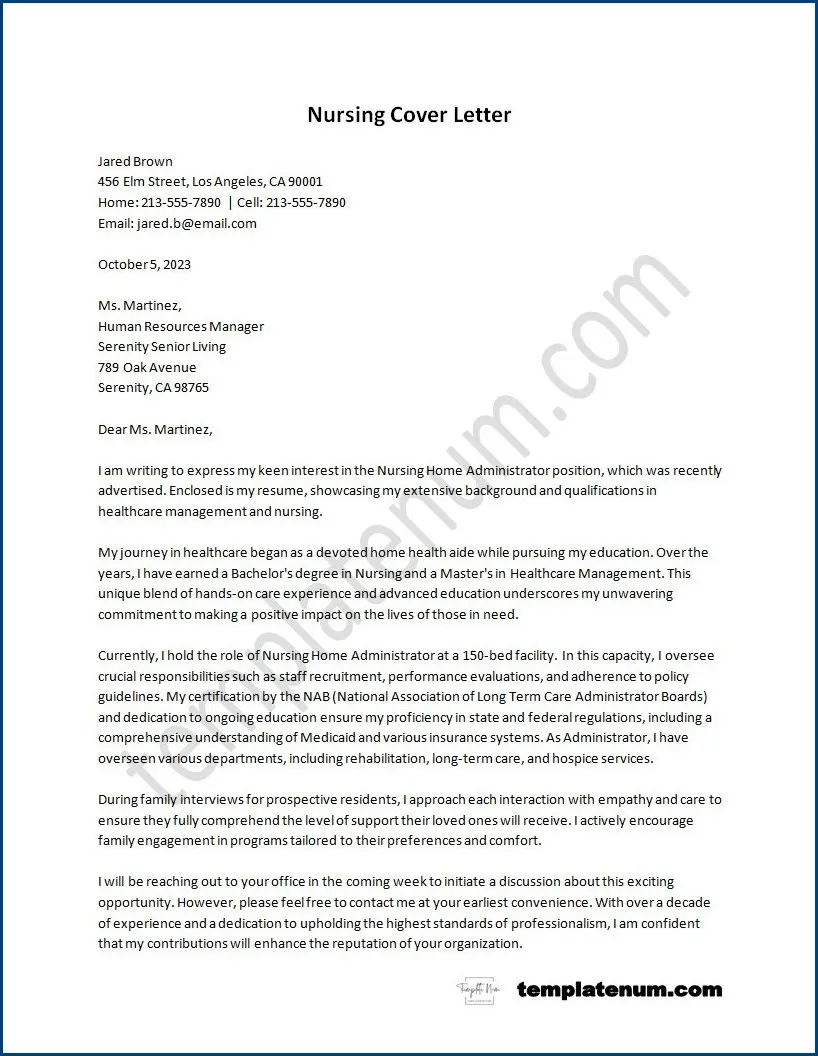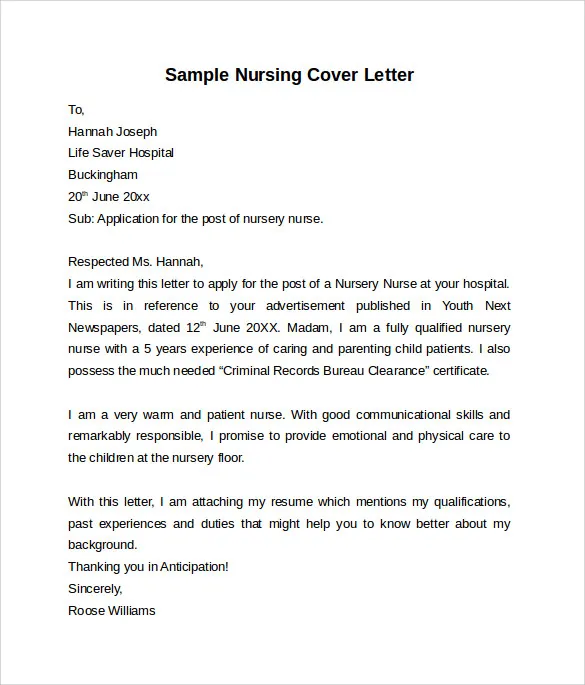Why a Nursing Cover Letter Matters
A nursing cover letter is your first impression, a crucial tool in your job application arsenal. It’s your chance to go beyond the bullet points of your resume and showcase your personality, passion, and suitability for the role. In the competitive field of nursing, a well-crafted cover letter can be the difference between getting an interview and being overlooked. It allows you to elaborate on your experiences, highlight your key skills, and demonstrate your understanding of the specific requirements of the job. A compelling cover letter will grab the attention of hiring managers, making them eager to learn more about you. Ignoring this step is a missed opportunity to present yourself as the ideal candidate and stand out from a crowd of applicants. Taking the time to create a tailored cover letter is an investment that can significantly improve your chances of landing your dream nursing job. A generic cover letter is easy to spot, so personalization is key.
How to Tailor Your Cover Letter for Nursing Jobs
Tailoring your cover letter to each specific nursing job is essential. Generic cover letters are easily dismissed by hiring managers. Start by carefully reviewing the job description, paying close attention to the required skills, qualifications, and experience. Identify the key requirements and find examples in your background that demonstrate your ability to meet those needs. Highlight relevant experiences and skills, using the language of the job description itself. Research the healthcare facility or organization to which you are applying. Understanding their mission, values, and patient care approach will help you align your cover letter with their culture and demonstrate your genuine interest. This will help demonstrate your enthusiasm and commitment. By tailoring your cover letter, you demonstrate your commitment and suitability for the role, increasing your chances of securing an interview. Remember, each application deserves a unique approach.
Highlighting Your Nursing Skills and Experience

Your nursing cover letter is a prime opportunity to showcase your skills and experience. Focus on the skills most relevant to the job you are applying for, such as patient assessment, medication administration, critical thinking, and communication. Provide specific examples of how you’ve utilized these skills in previous roles. Quantify your achievements whenever possible; for example, state how you reduced patient wait times or improved patient satisfaction scores. Emphasize any specialized skills, such as experience with electronic health records or specific medical equipment. Your experience is what makes you valuable, so be sure to write about all relevant experiences, whether it is in a hospital, clinic, or long-term care facility. Consider the specific needs of the employer and demonstrate how your skills and experience make you a strong fit for the role. Your aim is to paint a picture of yourself as a competent and capable nurse ready to contribute to their team.
Showcasing Your Achievements in Nursing
Beyond listing your responsibilities, showcase your accomplishments. Use the STAR method (Situation, Task, Action, Result) to describe a specific achievement. Start by setting the scene (Situation), explaining what the challenge was (Task), describing the steps you took (Action), and quantifying the outcome (Result). For example, you could detail how you improved patient outcomes by implementing a new protocol or how you mentored a new nurse. Quantifiable results, like increasing patient satisfaction scores, reducing medication errors, or decreasing readmission rates, make your accomplishments more impactful. Think about what sets you apart from other applicants. Highlighting your achievements will show your value and the impact you can make in a new role, providing concrete evidence of your capabilities. These details will make you stand out from the crowd. Remember to choose achievements that align with the job description and the values of the healthcare facility.
Formatting Your Nursing Cover Letter
A well-formatted cover letter is professional and easy to read. Use a clear, readable font like Arial or Times New Roman, with a font size between 10 and 12 points. Maintain consistent formatting throughout the document, including line spacing and margins. Start with your contact information (name, phone number, email) followed by the date, and the hiring manager’s name and title. Use a professional salutation, such as ‘Dear Mr./Ms./Mx. [Last Name]’. Structure your letter logically, with an introduction, body paragraphs, and a conclusion. Keep paragraphs concise and to the point, using headings to break up large blocks of text. Proofread carefully for any grammatical errors or typos before submitting your application. Adhering to proper formatting demonstrates your attention to detail and professionalism, making a positive impression on the hiring manager. This also helps to ensure that you are presenting yourself in the best possible light.
Contact Information and Salutations

Your cover letter must begin with your contact information. Include your full name, phone number, and professional email address. Make sure your email address is appropriate and professional; avoid using nicknames or unprofessional language. Following your contact information, include the date and the hiring manager’s name and title, if known. If you are unsure of the hiring manager’s name, research the company’s website or LinkedIn to find this information. This shows you’ve taken the time to personalize your application. Begin your letter with a professional salutation, such as ‘Dear Mr./Ms./Mx. [Last Name]’. Avoid generic greetings like ‘To Whom It May Concern.’ Personalizing your salutation demonstrates respect and attention to detail, setting a positive tone for the rest of your letter. If you don’t know the hiring manager’s name, you can use a more general greeting such as ‘Dear Hiring Manager,’ but always try to find a specific name.
Crafting the Body of Your Nursing Cover Letter
The body of your cover letter is where you showcase your skills, experience, and achievements. Start with an introductory paragraph that states the position you are applying for and where you saw the job posting. In the subsequent paragraphs, elaborate on your skills and experience, aligning them with the job requirements. Use the STAR method to provide specific examples of your accomplishments. Emphasize your passion for nursing and your commitment to patient care. Explain why you are interested in the specific healthcare facility and how your values align with their mission. Consider including a paragraph that highlights your understanding of the challenges and opportunities in the nursing field. Be concise and focus on what makes you the best candidate for the job. Your goal is to persuade the hiring manager that you are the right person for the role, creating a compelling narrative that demonstrates your abilities and suitability.
Writing a Strong Closing for Your Cover Letter
Your closing paragraph is your last chance to leave a lasting impression. Reiterate your interest in the position and express your enthusiasm for the opportunity. Include a call to action, such as, ‘I am eager to discuss my qualifications further in an interview.’ Thank the hiring manager for their time and consideration. Reiterate your contact information if you have not already done so. End your cover letter with a professional closing, such as ‘Sincerely,’ or ‘Best regards,’ followed by your typed name. Proofread your entire cover letter before submitting. A strong closing leaves a positive impression, making the hiring manager more likely to consider your application. Your closing should be polite, professional, and demonstrate your eagerness for the job.
Reviewing and Proofreading Your Nursing Cover Letter

Before submitting your cover letter, review and proofread it carefully. Check for any grammatical errors, typos, and formatting inconsistencies. Ensure that your letter is easy to read and free of jargon or overly complex language. Have a friend, mentor, or career counselor review your cover letter for feedback. They can offer a fresh perspective and catch any errors you might have missed. Make sure your letter is tailored to the specific job and highlights the skills and experience required. Verify that all contact information is accurate and up-to-date. Proofreading is an essential step. A well-written, error-free cover letter reflects your attention to detail and professionalism. Taking this time to ensure your letter is polished and free of errors will increase your chances of making a strong first impression and securing an interview.
